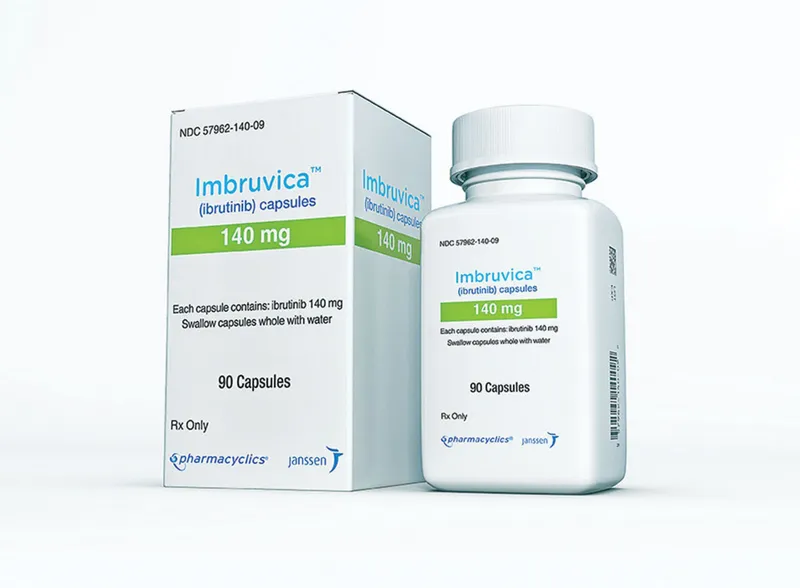Comprehensive Guide to Ibrutinib: Uses, Dosage, Side Effects, and More
What is Ibrutinib?
Overview of Ibrutinib
Generic Name: Ibrutinib
Brand Name: Imbruvica, generics
Drug Group: Kinase inhibitor (antineoplastic, immunomodulatory)
Commonly Used For
- Treat chronic lymphocytic leukemia (CLL).
- Manage mantle cell lymphoma (MCL).
- Address Waldenström macroglobulinemia (WM).
Key Characteristics
Form: Oral capsules or tablets (140 mg, 280 mg, 420 mg, 560 mg) (detailed in Dosage section).
Mechanism: Inhibits BTK, disrupting B-cell proliferation and survival.
Approval: FDA-approved (2013 for Imbruvica) and EMA-approved for hematologic malignancies.

Indications and Uses of Ibrutinib
Ibrutinib is indicated for a range of hematologic malignancies and autoimmune conditions, leveraging its targeted BTK inhibition:
Chronic Lymphocytic Leukemia (CLL)/Small Lymphocytic Lymphoma (SLL): Treats CLL/SLL in treatment-naïve or relapsed/refractory cases, per oncology guidelines, supported by clinical trials showing progression-free survival rates exceeding 80% at 2 years.
Mantle Cell Lymphoma (MCL): Manages relapsed or refractory MCL after at least one prior therapy, improving response rates, recommended in hematology protocols.
Waldenström Macroglobulinemia (WM): Controls symptomatic WM, reducing immunoglobulin M levels, with evidence from lymphoma studies.
Marginal Zone Lymphoma (MZL): Approved for relapsed/refractory MZL after anti-CD20 therapy, with oncology data.
Chronic Graft-Versus-Host Disease (cGVHD): Treats steroid-dependent or refractory cGVHD post-transplant, per transplant medicine research.
Autoimmune Hemolytic Anemia (AIHA): Investigated off-label to manage refractory cases, with hematology-immunology evidence.
Multiple Myeloma: Explored off-label in combination therapies, with myeloma research.
Primary Central Nervous System Lymphoma (PCNSL): Used off-label in select cases, with neuro-oncology studies.
Immune Thrombocytopenic Purpura (ITP): Initiated off-label to reduce platelet destruction, with hematology data.
Rheumatoid Arthritis (RA): Investigated off-label for BTK-mediated inflammation, with rheumatology research.
Dosage of Ibrutinib
Dosage for Adults
CLL/SLL: 420 mg once daily (3 x 140 mg capsules or 1 x 420 mg tablet) until disease progression or unacceptable toxicity.
MCL: 560 mg once daily (4 x 140 mg capsules or 2 x 280 mg tablets) until progression or intolerance.
WM: 420 mg once daily until progression or toxicity.
MZL: 560 mg once daily until progression or intolerance.
cGVHD: 420 mg once daily until disease control or toxicity, with tapering considered.
Dosage for Children (≥1 year, Off-Label)
CLL or cGVHD: 240–420 mg/m² once daily (max 560 mg), adjusted based on body surface area and tolerance, under pediatric oncology supervision.
Dosage for Pregnant Women
Pregnancy Category D: Avoid unless benefits outweigh risks; consult an obstetrician and oncologist, with fetal monitoring.
Dosage Adjustments
Renal Impairment:
Mild to moderate (CrCl 30–89 mL/min): No adjustment; severe (CrCl <30 mL/min): Avoid due to limited data.
Hepatic Impairment:
Mild (Child-Pugh A): 140 mg once daily; moderate (Child-Pugh B): 280 mg once daily; severe (Child-Pugh C): Avoid.
Concomitant Medications: Adjust if combined with CYP3A inhibitors (e.g., ketoconazole) or inducers (e.g., rifampin); reduce dose or avoid.
Elderly: No specific adjustment; monitor for toxicity due to age-related decline.
Toxicity Management: Interrupt or reduce dose (e.g., to 280 mg or 140 mg daily) for grade 3/4 adverse events (e.g., neutropenia, bleeding).
Additional Considerations
- Take this active ingredient with a full glass of water, with or without food, at the same time daily.
- Swallow capsules or tablets whole; do not crush or chew.
- Avoid grapefruit juice or Seville oranges due to CYP3A inhibition.
How to Use Ibrutinib
Administration:
Oral: Take with water, with or without food, at a consistent time daily.
Use a pillbox or reminder system for adherence in chronic therapy.
Timing: Administer once daily, preferably in the morning or evening, to maintain steady levels.
Monitoring: Watch for bruising, fever, or signs of atrial fibrillation (e.g., palpitations); report changes immediately.
Additional Tips:
- Store at 20–25°C (68–77°F), protecting from moisture and light.
- Keep out of reach of children due to toxicity risk.
- Use prophylactic antimicrobials (e.g., acyclovir, fluconazole) if prescribed to prevent infections.
- Schedule regular blood tests (e.g., CBC, liver function) every 1–2 weeks during initial therapy.
- Avoid live vaccines during treatment to reduce infection risk.
Contraindications for Ibrutinib
Hypersensitivity: Patients with a known allergy to Ibrutinib or its components.
Severe Hepatic Impairment: Contraindicated in Child-Pugh Class C due to metabolism concerns.
Severe Renal Impairment: Avoid in CrCl <30 mL/min due to limited excretion data.
Active Uncontrolled Infections: Contraindicated until infection is managed, due to immunosuppression risk.
Major Surgery: Avoid within 7 days of major surgery due to bleeding risk.
Pregnancy and Breastfeeding: Contraindicated due to teratogenic potential.
Warnings & Precautions for Ibrutinib
General Warnings
Hemorrhage: Risk of major bleeding (e.g., gastrointestinal, intracranial); monitor for bruising or blood in stool.
Infections: Risk of opportunistic infections (e.g., pneumonia, fungal); use prophylaxis if indicated.
Atrial Fibrillation: Risk of cardiac arrhythmias; monitor ECG in at-risk patients.
Cytopenias: Risk of neutropenia, thrombocytopenia, or anemia; check CBC regularly.
Second Primary Malignancies: Increased risk of skin cancers; perform dermatologic exams.
Additional Warnings
Hypertension: Risk of elevated blood pressure; monitor and manage with antihypertensives.
Tumor Lysis Syndrome: Risk in high tumor burden; initiate hydration and allopurinol if needed.
Liver Toxicity: Risk of hepatotoxicity; check liver enzymes every 2 weeks initially.
Interstitial Lung Disease: Rare risk; discontinue if respiratory symptoms worsen.
Hypersensitivity Reactions: Rare anaphylaxis; stop if severe.
Use in Specific Populations
Pregnancy: Category D; avoid and use contraception during and for 1 month after therapy.
Breastfeeding: Contraindicated; discontinue nursing during treatment.
Elderly: Higher toxicity risk; adjust dose based on tolerance.
Children: Safe off-label with oncology oversight.
Renal/Hepatic Impairment: Adjust or avoid based on severity.
Additional Precautions
- Inform your doctor about liver disease, heart conditions, or recent infections before starting this medication.
- Avoid alcohol to reduce gastrointestinal irritation and bleeding risk.
- Use sunscreen and protective clothing to mitigate skin cancer risk.
Overdose and Management of Ibrutinib
Overdose Symptoms
- Nausea, diarrhea, or rash.
- Severe cases: Severe bleeding, infections, or cardiac arrest.
- Fatigue, bruising, or fever as early signs.
- Coma or profound cytopenias with extremely high doses.
Immediate Actions
Contact the Medical Team: Seek immediate medical help if overdose is suspected.
Supportive Care: Monitor vital signs, provide blood transfusions if needed, and manage infections with antibiotics.
Specific Treatment: No specific antidote; discontinue and provide supportive care (e.g., G-CSF for neutropenia).
Monitor: Check CBC, liver function, and ECG for 24–48 hours; assess for bleeding or arrhythmias.
Patient Education: Advise against doubling doses and to store securely.
Additional Notes
- Overdose risk is linked to dosing errors; store out of reach of children.
- Report persistent symptoms (e.g., severe fatigue, irregular heartbeat) promptly.
Side Effects of Ibrutinib
Common Side Effects
- Diarrhea (20–30%, managed with loperamide)
- Fatigue (15–25%, reduced with rest)
- Bruising (10–20%, monitored for bleeding)
- Nausea (10–15%, relieved with food)
- Rash (5–10%, treated with moisturizers)
These effects may subside with adaptation or dose adjustment.
Serious Side Effects
Seek immediate medical attention for:
- Hemorrhagic: Major bleeding (e.g., intracranial hemorrhage) or prolonged bleeding.
- Infectious: Severe infections (e.g., sepsis, pneumonia).
- Cardiac: Atrial fibrillation or heart failure.
- Hematologic: Neutropenia (<500/µL) or thrombocytopenia (<50,000/µL).
- Allergic: Anaphylaxis or severe rash (e.g., Stevens-Johnson syndrome).
Additional Notes
- Regular monitoring with CBC every 1–2 weeks and ECG if symptomatic is essential to detect cytopenias or arrhythmias early.
- Patients with a history of hypertension should monitor blood pressure weekly.
- Report any unusual symptoms (e.g., chest pain, high fever) immediately to an oncologist to address potential complications.
- Long-term use (>6 months) requires dermatologic screening for secondary malignancies.
Drug Interactions with Ibrutinib
This active ingredient may interact with:
- CYP3A Inhibitors: Increases levels (e.g., itraconazole); reduce dose to 140 mg or avoid.
- CYP3A Inducers: Decreases levels (e.g., rifampin); avoid or increase dose under monitoring.
- Anticoagulants: Enhances bleeding risk (e.g., warfarin); monitor INR.
- Antiplatelets: Potentiates bleeding (e.g., aspirin); use cautiously.
- Statins: Increases myopathy risk (e.g., atorvastatin); monitor muscle symptoms.
Action: Provide your healthcare provider with a complete list of medications.
Patient Education or Lifestyle
Medication Adherence: Take this kinase inhibitor as prescribed for cancer treatment, following the daily schedule.
Monitoring: Report bleeding, fever, or signs of heart issues immediately.
Lifestyle: Avoid alcohol; engage in light exercise to maintain strength.
Diet: Take with or without food; avoid grapefruit products.
Emergency Awareness: Know signs of severe infection or bleeding; seek care if present.
Follow-Up: Schedule regular check-ups every 1–2 weeks to monitor blood counts and cardiac health.
Pharmacokinetics of Ibrutinib
Absorption: Oral, peak at 1–2 hours; bioavailability ~3–4% (affected by food).
Distribution: Volume of distribution ~10 L; 97% protein-bound.
Metabolism: Hepatic via CYP3A4 and CYP2D6 to active metabolites.
Excretion: Primarily fecal (80% as metabolites); renal (10%); half-life 4–6 hours.
Half-Life: 4–6 hours, with prolonged effects due to active metabolites.
Pharmacodynamics of Ibrutinib
This drug exerts its effects by:
- Irreversibly inhibiting BTK, blocking B-cell signaling pathways.
- Reducing tumor growth in CLL, MCL, and WM.
- Exhibiting dose-dependent risks of bleeding and immunosuppression.
Storage of Ibrutinib
- Temperature: Store at 20–25°C (68–77°F); protect from moisture and light.
- Protection: Keep in original container, away from heat and humidity.
- Safety: Store in a secure location out of reach of children and pets due to toxicity.
- Disposal: Dispose of unused tablets per local regulations or consult a pharmacist.
Frequently Asked Questions (FAQs)
Q: What does Ibrutinib treat?
A: This medication treats blood cancers like CLL and MCL.
Q: Can this active ingredient cause diarrhea?
A: Yes, diarrhea is common; use loperamide if needed.
Q: Is Ibrutinib safe for children?
A: Yes, off-label with supervision.
Q: How is this drug taken?
A: Orally as capsules or tablets, once daily.
Q: How long is Ibrutinib treatment?
A: Often continuous until progression or toxicity.
Q: Can I use Ibrutinib if pregnant?
A: No, avoid; consult a doctor.
Regulatory Information
This medication is approved by:
U.S. Food and Drug Administration (FDA): Approved in 2013 (Imbruvica) for CLL, MCL, and other indications.
European Medicines Agency (EMA): Approved for hematologic malignancies and cGVHD.
Other Agencies: Approved globally for oncology use; consult local guidelines.
References
- U.S. Food and Drug Administration (FDA). (2023). Imbruvica (Ibrutinib) Prescribing Information.
- Official FDA documentation detailing the drug’s approved uses, dosage, and safety.
- European Medicines Agency (EMA). (2023). Ibrutinib Summary of Product Characteristics.
- EMA’s comprehensive information on the medication’s indications and precautions in Europe.
- National Institutes of Health (NIH). (2023). Ibrutinib: MedlinePlus Drug Information.
- NIH resource providing detailed information on the drug’s uses, side effects, and precautions.
- World Health Organization (WHO). (2023). WHO Model List of Essential Medicines: Ibrutinib.
- WHO’s consideration of Ibrutinib for cancer therapy.
- Blood Journal. (2022). Ibrutinib in CLL.
- Peer-reviewed article on Ibrutinib efficacy (note: access may require a subscription).
